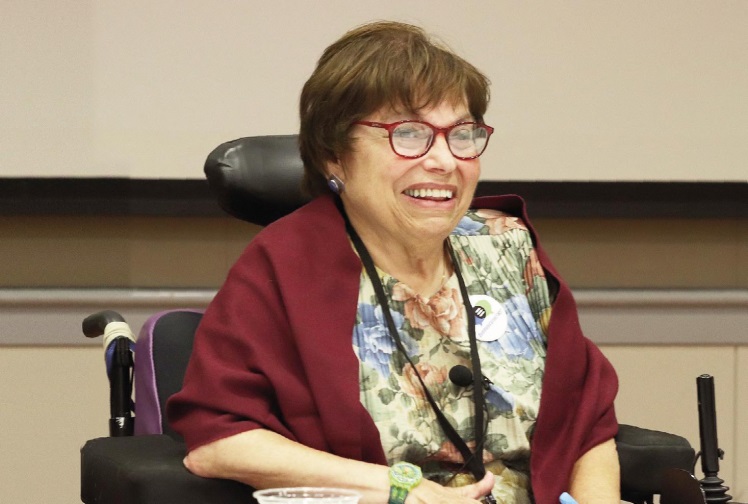BOOK REVIEW

BEING HEUMANN
BY HAL BAKER, FAAIDD
Judy Heumann opens her memoir with a poignant portrayal of growing up with a physical disability resulting from a case of polio she contracted at 18 months of age. She recounts her childhood playing with friends in her Brooklyn neighborhood, of going to Synagogue and enjoying the love and support of her close family, but not of going to school.
She remembers the first day of kindergarten, when she was excited to be with her friends in class and getting to pick out the dress she would wear, only to be met at the door by the principal of her neighborhood public school, after she was carried up the steps. He told her mother that she couldn't go to school as she posed a danger to the other students in case of an emergency – she was using a wheelchair, she was a fire hazard.
This incident, along with other denials of her rights, such as not being allowed to become a teacher after she had earned a
degree with the highest honors and passed all or the required exams, certainly laid the foundation for her to become one of the most accomplished activists for the rights of people with disabilities in our nation's history.

- Title: Being Heumann: An Unrepentant Memoir of a Disability Rights Activist
- Author: Judith Heumann with Kristen Joiner
- Publisher: Beacon Press
- Publication Date: February 2020
- Paperback: 240 pages
- ISBN-13: 978-0807019290
- Available at: Beacon Press, amazon.com and barnesandnoble.com
Her story is full of the indignities suffered by those who have to depend on others for so much of their daily activities. While she
never displayed the anger you would expect directed to individuals who shunned or denied her access or inclusion, she often remarked that she felt anger, however, it was directed at the system that failed to accommodate all of the individuals with disabilities, both in the US and eventually, all around the world.
She directed her frustration to changing the systems, and she had incredible success after many long, hard fought battles at the highest levels of government. Along the way, she learned the art of community activism and how to be completely transparent and inclusive of everyone’s ideas and opinions, no matter the lengths she had to go to get everyone on the same page.
She takes the reader through all of the momentous changes in laws and practices from 504 of the Rehabilitation Act to IDEA and the ADA. Her involvement and leadership in these Civil and Human Rights Acts is remarkable. As a teacher and professional in the field, I was able to benefit from the changes she led and fostered while never recognizing the tremendous efforts which were needed to cause the changes. I was one of thousands who have benefited from her activism and it is exciting to be able to hear her tell of the processes that it took to achieve these landmark accomplishments.
The back story of the organizing and political maneuvering is remarkable in light of the difficulties the individuals faced from an unaware public body. Also remarkable is that she shows no animosity for those who were intolerant to her and her fellow activists. She does conclude by showing concern that the climate she worked in was one where compromise was possible across the aisles, as it were, while today she is fearful that the cooperation it takes to move forward with protecting and assuring civil and human rights is missing.
She paints a picture of what it is like to be included, as in a camp for kids with disabilities, and excluded, as in what it was like not to be able to go to school with her friends. She knows it is possible for all the accomplishments to be negated if we are all not diligent in continuing to actively advocate. •
ABOUT THE AUTHOR:
Hal Baker, FAAIDD, is the Community Advocate, The Arc of Tennessee.